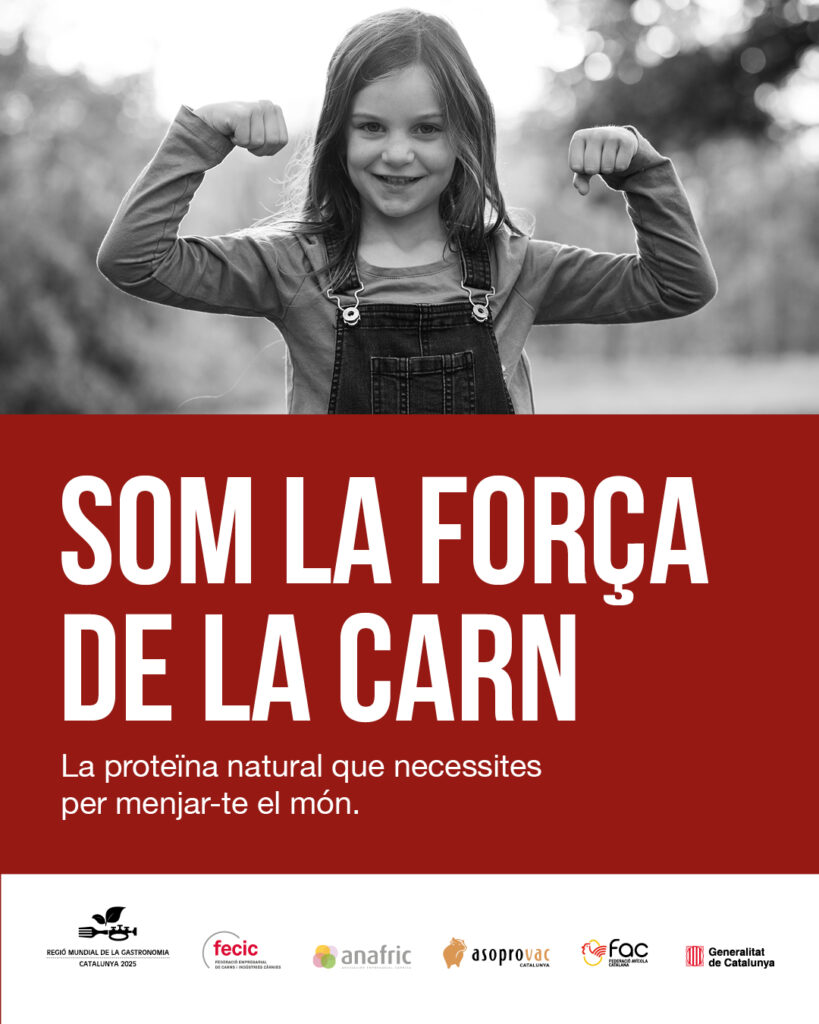The Meat and Meat Industry Business Federation (FECIC), the Meat Business Association (ANAFRIC), the Association of Beef Producers of Catalonia (ASOPROVAC), and the Catalan Poultry Federation (FAC) are jointly promoting the “Strength of Meat” initiative. The initiative aims to highlight meat and its fundamental role in the gastronomy, economy, and culture of Catalonia.

The project has special significance this year, as Catalonia holds the distinction of World Region of Gastronomy, a recognition awarded by the IGCAT (International Institute of Gastronomy, Culture, Arts and Tourism). This title aims to highlight and promote those communities that actively contribute to improving people’s quality of life by highlighting different food cultures, health and sustainability education, and gastronomic innovation. It is a territorial development initiative that encourages collaboration between public agencies, the primary sector, the food industry, restaurants, tourism, culture, and educational institutions.
The Power of Meat
The entities promoting the initiative highly value this strategic partnership, as it will significantly optimize the actions to be carried out.
The phrase “The Power of Meat,” which gives the initiative its name, symbolizes the “power of the land” through the grazing herds and the respect for the product; the “power of the people” in their ability to unite families and generate moments of conviviality; and the “power of the product” thanks to its diversity and richness of flavors (beef, lamb and goat, poultry, pork, etc.). Furthermore, it is a “power that nourishes” due to its essential contribution of high biological value proteins, heme iron, and B vitamins, crucial for a balanced and healthy diet. Finally, it is the “strength of our cuisine,” an essential element both in Catalan culinary tradition and in its constant innovation.
To convey this message, various outreach and visibility initiatives will be carried out, such as advertising and sponsorships. Informational initiatives will also be implemented progressively, with the aim of consolidating the proposal and reaching a broad and diverse audience. The proposal includes a microsite with relevant information and downloadable materials designed to be easily shared on social media or used in stores and points of sale.
“The Strength of Meat” will be presented at an information event to be held next Wednesday, June 11, at 6:30 p.m., in the city of Vic, with the presence of Rosa Cubel, Secretary of Food of the Department of Agriculture, Livestock, Fisheries, and Food of the Generalitat of Catalonia.
At this presentation, a manifesto reflecting the collective’s commitment will be symbolically signed.
Some figures
The meat industry is the main agri-food sector in Catalonia, with a turnover exceeding €10 billion. It represents more than 35% of the agri-food sector, 36% of employment, and more than 16% of the number of companies.
Catalonia annually produces more than two and a half million tons of meat from all species: pork, beef, sheep, goats, horses, poultry, and rabbits.
In 2024, the most produced meat in Catalonia was pork (with more than 2 million tons), followed by poultry (with 367,000 tons), beef (143,000 tons), sheep (12,000 tons), and rabbits (5,000 tons). Almost all meats (with the exception of sheep and rabbits) experienced small increases of 2-3% compared to the previous year. Veal saw the largest growth, at 8%.
49% of the meat produced in Catalonia is for direct consumption (i.e., meat that reaches the consumer with little or no further processing), and 51% is used as raw material for the food industry.
Catalonia exports more than 43%, in both volume and value, of the total meat exported by Spain and nearly 6%, in volume and value, to the European Union. The main markets to which Catalonia exports meat and sausages are France, Italy, China, Japan, Portugal, and Poland.
















